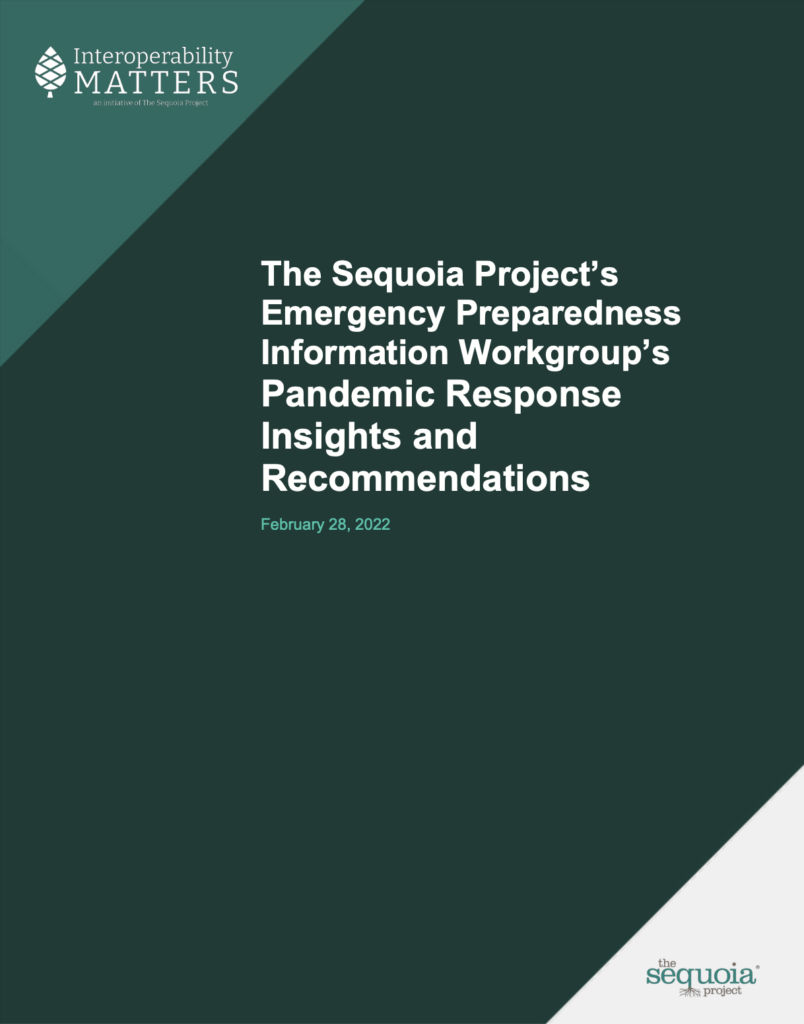The Sequoia Project Releases a Useful Workgroup Report on Information and Pandemic Response
 Noam H. ArztIn February 2022 the Sequoia Project released its Emergency Preparedness Information Workgroup’s Pandemic Response Insights and Recommendations. This workgroup was convened in the fall of 2020 at the height of the pandemic with a diverse set of stakeholders from all areas of the healthcare system. The resulting short report is worth a read as it offers concise analysis and recommendations.
Noam H. ArztIn February 2022 the Sequoia Project released its Emergency Preparedness Information Workgroup’s Pandemic Response Insights and Recommendations. This workgroup was convened in the fall of 2020 at the height of the pandemic with a diverse set of stakeholders from all areas of the healthcare system. The resulting short report is worth a read as it offers concise analysis and recommendations.
The first task the workgroup undertook was to conduct a SWOT (strengths, weaknesses, opportunities, threats) analysis focused on pandemic response. There was a strong public health focus that resulted from this activity: “During a declared emergency, and during non-emergency times as well, public health should be viewed as a collaborator and partner with equal access to shared data” (p. 6). There was also a strong recognition that workforce capability has a lot to do with pandemic preparedness, as does the connection between what goes on at the local level and the national planning strategy.
The report then provides sixteen succinct recommendations
- Reconcile Big Ideas with Realism
- Expand Access to Prescription Monitoring Program Data
- Stop Duplicative Efforts
- Evaluate Data Analytics Capabilities
- Support Vaccination Equity
- Share Vaccination Records Bi-Directionally
- Assess Public Health Emergency Response Technology Tools
- Support Healthcare Equity
- Address Public Health and Emergency Response IT Infrastructure
- Ease Legislative Policy and Regulatory Constraints for Data Sharing
- Identify State and Local Emergency Response Workforce Resources and Capabilities
- Develop Funding Sustainability and Matching
- Understand Funding Opportunities
- Address Policy Confusion
- Leverage the Lessons of Other States
- Build on Existing Infrastructure
 With our focus in public health information technology, I was drawn to a few of these recommendations in particular. “Address Public Health and Emergency Response IT Infrastructure” is being largely addressed through CDC’s Data Modernization Initiative (DMI) as well as targeted Congressional funding for public health systems including Immunization Information Systems (IIS) and electronic case reporting (eCR). “Assess Public Health Emergency Response Technology Tools” will likely happen in that DMI context, but additional information needs to be made available to potential information technology procurers to assist in making good purchase decisions. Open source technologies should also play a major part in the solution landscape and there has been very little attention given to this in public health to date.
With our focus in public health information technology, I was drawn to a few of these recommendations in particular. “Address Public Health and Emergency Response IT Infrastructure” is being largely addressed through CDC’s Data Modernization Initiative (DMI) as well as targeted Congressional funding for public health systems including Immunization Information Systems (IIS) and electronic case reporting (eCR). “Assess Public Health Emergency Response Technology Tools” will likely happen in that DMI context, but additional information needs to be made available to potential information technology procurers to assist in making good purchase decisions. Open source technologies should also play a major part in the solution landscape and there has been very little attention given to this in public health to date.
I was puzzled a bit by “Share Vaccination Records Bi-Directionally.” Most IIS do in fact support data query by clinical providers, and an increasing number are enabling various forms of direct consumer access through portals and mobile apps including the issuance of vaccine credentials. As for the suggestion that HL7 v2 Admission, Discharge, and Transfer (ADT) messaging might somehow be useful when query is not available, this is not something that IIS are capable of supporting at this time. If anything, the future focus for IIS and data access will shift to HL7 Fast Healthcare Interoperability Resources (FHIR), but even that is some time off.
This post was authored by Noam H. Arzt, and first published in the HLN Blog. It is reprinted by Open Health News with permission from the author. The original post can be found here.
- Tags:
- Centers for Disease Control and Prevention(CDC)
- Data Modernization Initiative (DMI)
- electronic case reporting (eCR)
- Emergency Preparedness and Response (EPR)
- emergency response IT infrastructure
- HL7 Fast Healthcare Interoperability Resources (FHIR)
- HLN Consulting
- Immunization Information Systems (IIS)
- Noam H. Arzt
- open source technologies
- pandemic preparedness
- pandemic response
- prescription monitoring program data
- Public Health emergency response technology tools
- public health focus
- public health information technology
- Public Health IT infrastructure
- SWOT analysis
- The Sequoia Project
- vaccination records sharing
- vaccine credentials
- Login to post comments